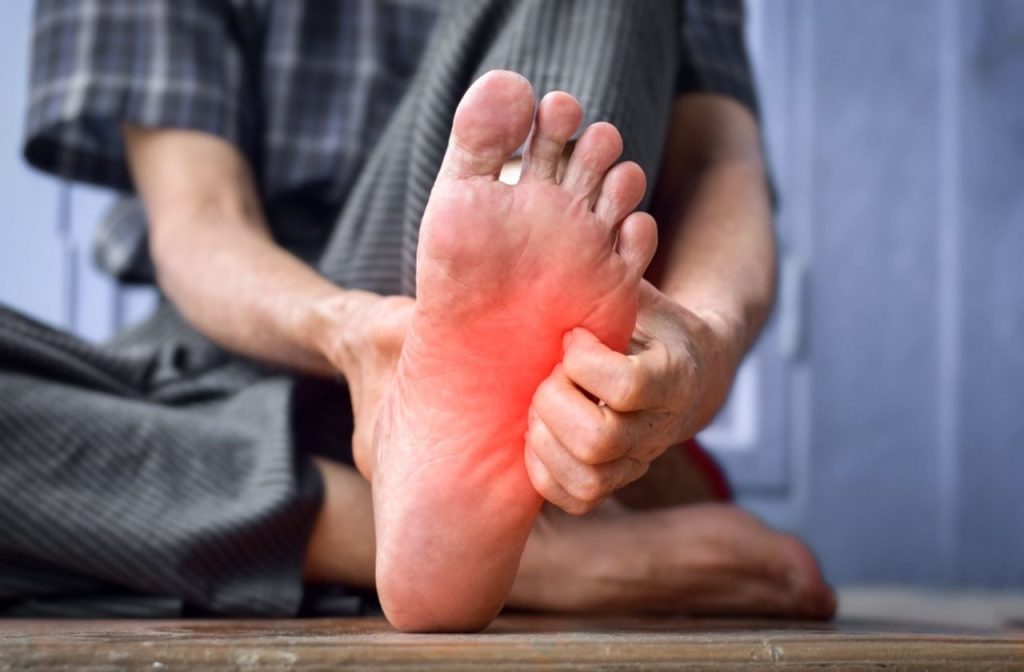Tingling or pins and needles in the feet can be an uncomfortable sensation that can range from mildly irritating too quite painful. While occasional tingling in the feet is generally not a cause for concern, persistent tingling can be a symptom of an underlying medical condition. Here are ten possible reasons why you may be experiencing tingling or pins and needles in your feet.

1. Poor Circulation
One of the most common causes of tingling in the feet is poor circulation. When blood flow to the feet is restricted, it can cause a lack of oxygen and nutrients to the nerves, leading to tingling or pins and needles. Poor circulation can be caused by a variety of factors, including smoking, high blood pressure, high cholesterol, obesity, and sedentary lifestyle. If you have poor circulation, your doctor may recommend lifestyle changes, such as increasing physical activity, quitting smoking, and managing chronic conditions.
2. Nerve Damage
Nerve damage, also known as neuropathy, can also cause tingling in the feet. This can be caused by a variety of conditions, including diabetes, multiple sclerosis, and alcoholism. Neuropathy can also be caused by certain medications, such as chemotherapy drugs and HIV medications. Symptoms of neuropathy can include tingling, numbness, pain, and weakness. Treatment for neuropathy depends on the underlying cause and may include medication, lifestyle changes, and physical therapy.
3. Vitamin Deficiencies
Certain vitamin deficiencies, such as B12 and vitamin D, can also cause tingling in the feet. These vitamins are important for nerve health, and a lack of them can lead to nerve damage and tingling. B12 is found in animal products, such as meat, fish, and dairy, while vitamin D is synthesized by the body in response to sunlight. If you are deficient in these vitamins, your doctor may recommend supplements or dietary changes.
4. Compression
Compression of the nerves in the feet can also cause tingling. This can be caused by wearing tight shoes or socks, or by crossing your legs for an extended period. If you are experiencing tingling due to compression, it is important to take frequent breaks to stretch and move your legs and feet.
5. Pinched Nerves
Pinched nerves in the back or neck can also cause tingling in the feet. This can be caused by conditions such as herniated discs or spinal stenosis. Pinched nerves can cause a variety of symptoms, including tingling, numbness, and weakness. Treatment for pinched nerves depends on the underlying cause and may include medication, physical therapy, or surgery.
6. Infections
Certain infections, such as shingles and Lyme disease, can also cause tingling in the feet. These infections can affect the nerves and cause tingling, along with other symptoms such as rash, fever, and fatigue. If you suspect that you have an infection, it is important to seek medical attention as soon as possible to prevent complications.
7. Medications
Certain medications, such as chemotherapy drugs and HIV medications, can also cause tingling in the feet as a side effect. If you are experiencing tingling due to medication, it is important to speak with your doctor to determine if there is an alternative medication that may be less likely to cause side effects.
8. Hypothyroidism
Hypothyroidism, a condition in which the thyroid gland does not produce enough hormones, can also cause tingling in the feet. This is because the thyroid hormones are important for nerve health. Other symptoms of hypothyroidism can include fatigue, weight gain, and depression. Treatment for hypothyroidism typically involves medication to replace the missing hormones.
9. Anxiety and Stress
Anxiety and stress can also cause tingling in the feet. This is because stress and anxiety can cause the body to release adrenaline, which can cause blood vessels to constrict and restrict blood flow to the feet. This can cause tingling, along with other symptoms such as racing heart, sweating, and shortness of breath. Treatment for anxiety and stress can include therapy, medication, and lifestyle changes such as exercise and stress-management techniques.
10. Raynaud’s Syndrome
Raynaud’s Syndrome is a condition where constriction of blood vessels in the fingers and toes reduces blood flow resulting in tingling or numbness. This can be triggered by cold temperatures or stress, and can be accompanied by other symptoms such as color changes in the skin and pain. Treatment for Raynaud’s Syndrome can include medications, lifestyle changes such as avoiding cold temperatures, and avoiding triggers.
If you are experiencing persistent tingling in your feet, it is important to speak with your doctor to determine the underlying cause and develop an appropriate treatment plan. In many cases, lifestyle changes such as exercise and diet modifications can help improve symptoms, while in more severe cases, medication or surgery may be necessary. It is important to seek medical attention promptly to prevent complications and ensure optimal health and well-being.

